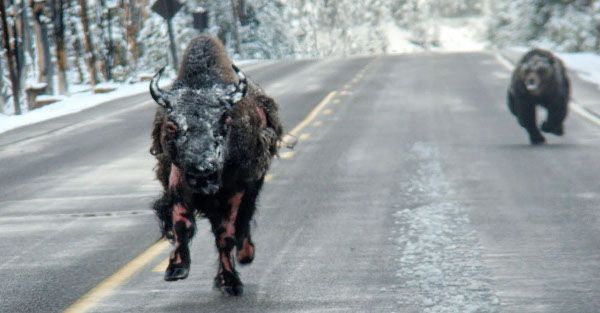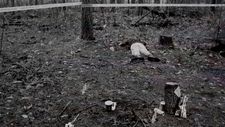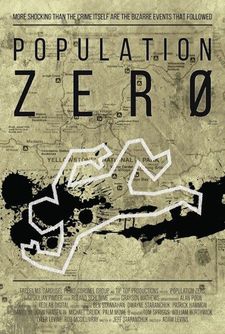 |
| Bear Chasing Bison in Population Zero |
When it comes to high concept films, Population Zero is up there. A stranger accompanies three young men to a remote area of Yellowstone National Park. He guns them all down. Then he walks to a nearby ranger station and confesses, but he never goes to prison for it, because in that particular little strip of land it is impossible to prosecute such a crime. A premise like this is a challenge to develop, but filmmakers Adam Levins and Julian Pinder do so very successfully, and raise a lot of interesting questions along the way.
When I catch up with Adam he tells me that he's very excited that the film is being screened at Frightfest. He also tells me that he's been a father for one week - "definitely the biggest achievement so far in my life" - so everything is a bit overwhelming just now and he has a lot of things to balance. I thank him for taking the time out to talk about the film, but he clearly enjoys doing so, and is quick to begin expounding on the reason why he found the project appealing.
"My whole reason for taking on this project – it definitely wasn’t for money! It was a passion thing for me. I think it’s interesting recently that there’s this thing going on, you know, with projects the like The Jinx and other ones like The Staircase, where filmmakers are getting more and more involved not just in telling the story but in influencing it in some ways. Like in The Jinx, for example, they basically got Robert Durst convicted because they were the ones that caught him confessing, when he was taking a leak in the bathroom and he had his lapel on and he said “I killed them all,” and then they didn’t turn that information over, they actually sat on it because it was in their best interests to have the exclusive on that. In that case it seems innocent that the filmmakers were judge jury and executioner. In other ways all you need is a bad egg and then that power that, you know, storytellers and filmmakers have to spread their influence across America and all across the rest of the world, that’s like a very dangerous thing.
 |
| A crime scene waiting to happen? |
"And so that’s what I wanted to explore, was sort of like the idea of a documentarian like Julian coming to that point where he starts to become the story, and then there’s that dilemma: what do you do? I remember when I was at film school in Denmark, back in the day, we had this documentary filmmaker guy and he was very much one of these purists who said, like, you do not get involved in your stories, it doesn’t matter if someone is literally being shot in front of you, you’re just there to document it. That’s how you can justify those documentaries like, I don’t know if you saw, those orphanage ones in the Ukraine where they just observe the kids that are not getting fed and tell the story, because they can take themselves out of it. That was his take on it and there was a lot of debate in those classes about when is that right, when is that wrong? When do you put down the camera and go and help the kid, or whatever? So I think it’s a film about a filmmaker’s involvement and it’s also a film about what is truth? Those are the two big themes for me. What is the line that you can cross and how involved can you get in the story? And then that portrayal of the story and how true is it, and when does it get coloured by your opinions and your emotions, and how do you show that to the world?
Adam first told me about Population Zero in an interview we did last year about his previous film, Estranged. He'd already shot part of it at that point. It was the first I'd heard about the lawless area of Yellowstone, but when did he first hear about it?
"My manager – and I think at the time he was not my manager but he managed a few other people that I’d worked with – a friend of his was doing a documentary up there and tumbled across the story and it’s a pretty widespread story, you can read about it on the BBC, it’s called the Zone of Death," he says. "So he was thinking, what’s the best way to frame a story around this? And then he was talking to another one of his clients – a writer client of his, Jeff [Staranchuk] – and so he was brought on, and so I didn’t come along until there was an actual script. Even though it’s a documentary there was a script and that was, like, the blueprint, so I read that and I thought that was interesting and I thought it was exciting in the sense that I knew it wasn’t going to be just, there is the script, now we’re going to go and shoot it. It was like taking that script and tearing that script apart, and sort of then reinventing it.
"Julian came on board very late. We had looked at a lot of other documentarians before that and for one reason or another it didn’t work out, and Julian was the best at that. Whenever I had questions or was debating things in the script I would talk to Julian. So when we did the interviews, for instance, I would talk to Jeff who was the writer and we would come up with a list of questions that Julian could ask, but he was very relaxed. For the most part, in the edit, we found that it built quite organically."
Was it one of those films that came together in the edit?
"It was definitely one of those films... I’m used to editing fiction but I have cut documentary before. This was somewhere in the middle. I don’t have that much expertise in documentary, I’d shot some stuff, I’d edited a bit. Julian does this for a living – he’s out shooting right now on a Netflix show about wildfires here – and, you know, that’s what he does, he shoots documentaries like Jesus Town, USA and Trouble In The Peace. It’s interesting because he has this desire to move more into drama. He’s interested in the background that I come from which is more like fiction and drama."
Trouble In The Peace deals with fracking, which emerges as one factor in this complex tale. How important was that background?
"When we found Julian we were thinking, can we find a filmmaker that’s done more activism films in this area? so he fit the bill for that. Obviously he brought a lot to bear on that, but he wasn’t trying to be an activist about that, that was subject matter that he’d dealt with in a previous film. He was doing Jesus Town, USA at the time which is about an Easter pageant so it wasn’t like he was saying oh, I just want to jump in and expose the fracking industry, or anything, He’s very level headed about these things. He got what we were trying to do.
 |
| Population Zero poster |
"I’m not pro-fracking myself, I’m definitely against it, but my motivation wasn’t to make a film that blew the lid off the fracking industry. I think if we wanted to do that we would have done a different film."
Another important element is the Bear Chasing Bison image that recurs throughout the film, something that writer Jeff was apparently very keen to use.
"It was something that was important as a metaphor for Jeff, and the thing is, I think that metaphor changed a few times because it was quite a loose metaphor, and I think it was quite late in production that we re-wrote that voiceover and made it about who was the hunter and who was the prey. I think that because it’s such a powerful visual metaphor everyone wanted to keep it in there but it took a little while to work out how it blended with the story." He laughs.
So how was the actual process of filming in Yellowstone? Did he and Julian ever feel nervous there, given their subject matter?
"Julian and myself hired a small Canon camera package and then with no other crew just drove to Yellowstone and walked around and shot for about four days. That’s where you have all those actual scenes of him in the park. I wouldn’t say we ever felt in danger when we were there. Julian and I just got up really early in the morning and went out and shot all day for a handful of days and it was actually just really fun. We got on pretty well."
My colleague Anne-Katrin Titze wanted to know if the film was being submitted to DOC NYC, I tell him, and he says that there has been some back and forth about the possibility but that he's not sure what's happening at this stage. He has a lot of other festivals lined up, however, and is looking forward to seeing how audiences react. "We wanted to get people lost in the format of a documentary because that’s the best way to tell this story, so I hope that at the end people will be like, wow, that was really exciting – a different sort of viewing experience that they wouldn’t have gotten if we’d done it in another way," he says, but admits that he's had at least one bad reaction to the film so far and that a few people have misunderstood the intentions behind it. For him, the most important thing about it is simply the knowledge that that loophole in US law exists - that there is a place where it's possible to get away with murder. Apparently, it's a place anybody could stumble into accidentally when exploring Yellowstone - with no notable features, "it just looks like any other part of the park."
So what's his next project? He's busy making his living shooting adverts and videos, he says, but he definitely intends to make more films.
"I’m pursuing a few different films but I don’t have one that’s in pre-production yet. The thing about making films at this level is that it doesn’t pay very well so you have to have another angle in your life. I always try to take time out in my life every now and again to make a film. I felt that Population Zero was interesting enough to be worth that. You’ve seen Estranged and they’re very different. I intend for my next film to be equally different – I’m interested in doing either a thriller or a sci-fi."





















